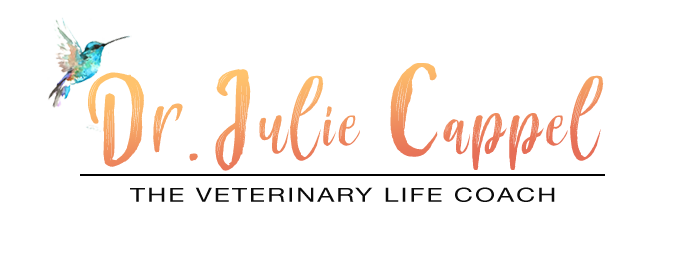One of my occupational hazards as a life coach and a veterinarian is becoming attached to my clients. I feel for them. My heart aches for them when they struggle with their families, pets, health, and other challenging situations. One of the myths we hold about veterinary medicine is that it is not supposed to be this way. We should never take on others' emotions, and if we do, it somehow means that we are unwell. The real problem is that we "think" we should not feel for others, and we fear feeling our own and others' negative emotions.
One of the best life skills that I was ever taught by my life coach and continue to work towards daily is not to fear negative emotions—working with challenges to feel all of the feelings.
This week I experienced an excellent opportunity to remind myself that empathy is good. I was preparing to go for a quick bike ride after work, and I stopped for a moment to check my email. I rarely check email while I am at work, and sometimes I miss things if I don't do a quick check when I get home. It happened that one of my coaching clients had emailed me that afternoon outlining some of the struggles that they were wrestling with that week. As a life coach, I love it when my clients reach out in times of trouble, and I do my best to offer them encouraging words and suggestions for easing their stress and processing their emotions. As I finished reading and thinking about my response, my husband reminded me that it looked like rain, and I better get my bike ride before the storm. I resolved to think through the email and get to my answer when I returned.
As I rolled down the driveway, I could see that the sky to my west looked threatening with dark swirling clouds off in the distance and the sky to the east was more friendly-looking with some less threatening clouds and a little sun. I started thinking about answering my client's email with some words to help her get through her week. As I turned the third corner on my way through the neighborhood, I saw a beautiful rainbow off in the distance. I was surprised to see it because I think of rainbows coming after the rain, but this one was opposite the storm clouds. It was a stark contrast of the dark threatening sky behind me and the rainbow in front of me; it occurred to me that I had my answer.
There are rainbows in the storms.
Challenges causing negative emotions allow us to appreciate our blessings when they do come. Why can't everything be easy? Because we need to experience bad to appreciate good. "That's life," my father-in-law, a general surgeon, frequently would say. He was a very empathetic man, so I know that he felt the emotion of his patients, but he took them calmly and without question as a normal part of life. He appreciated everything in his life because of his stressful, emotion-filled occupation.
Challenges give us essential feedback for our personal growth. When we face challenges in our daily life, we are gaining strength and wisdom. Many of the best things that I have created in my life have come out of intense struggle. Overcoming adversity is a life skill. The more hardship you have experienced, the more you can use the lessons to grow. Embracing all of our emotions brings us strength.
Challenges allow us to take responsibility for our own emotions and work on our ability to enjoy our empathy. Empathy can be challenging for us because it causes us to feel our own and others' negative emotions. Practicing allowing the full range of our feelings would change this profession if we allow ourselves to be vulnerable. The contrast of the approaching storm is what makes the rainbow beautiful.
On this stormy day, I allowed my feelings of empathy for my struggling client and allowed myself to feel the uncertainty of the approaching storm.
It is through the storms that we create our rainbows.
Dr. Jule Cappel
Join me on The Veterinary Life Coach Podcast!
New episode every Monday.















